Stanislav Byshok will explain the attitudes of the Russian public and the reactions of the Russian media to the growing tensions between Moscow and Washington over Ukraine in a two-part conversation hosted by Maria Cernat and Boyan Stanislavski. Other aspects of the Russian perspective on recent events and processes are also being discussed.
TRANSCRIPT:
Boyan Stanislavski
Hello and welcome to the Barricades. My name is Boyan Stanislavski, and I’m your host. And today, as usual, we’ve got the co-host of the program with me, Maria Cernat. Hello, Maria.
Maria Cernat
Hello. And we’ve got a special guest. But before I actually tell you who he is, I want to give you a bit of context regarding why we are actually having this person.
So in mid-January, we witnessed a series of events that were, to put it mildly, well, I would say bizarre or slightly bizarre from a diplomatic standpoint. The meetings in Geneva between the Russian and the American delegations, the meetings between the Russian delegation and NATO [North Atlantic Treaty Organization], the OSCE [the Organization for Security and Co-operation in Europe] meeting in Vienna, and now some kind of phone calls, talks, back and forth between the American Secretary of State and the Russian Foreign Minister.
Meanwhile, the public was fed yet another escalation of this truly unhinged, let’s say narrative, that Russia is just about to invade Ukraine. Apparently, for no reason. The Western narrative and the reactions of the Western public and the elites of various NATO and EU member countries are becoming increasingly contradictory, which I find particularly interesting in this context. France and Germany’s leaders appear to be, well, rather irritated by the growing threat of a military conflict and the prospect of a new round of sanctions against the Russian Federation. Also, the Nord Stream 2 pipeline is at stake in this dispute.
However, the paradigm-shifting shock was delivered to a global public opinion. I would say, back in December, when the Russian government proposed draft treaties that would prevent further NATO expansion to the East and other “legally binding security guarantees,” quote-unquote as the Russians refer to them. The global situation in terms of international relations shifted dramatically at that point, and something resembling a reverse Caribbean Crisis occurred. Of course, the explanation in the West and the mainstream media in Eastern Europe, rather repeating ones, is simple; it’s all because of Russia.
So today, we’ll take a look at how things are looking from the Russian perspective. It is, of course, not so much about what the government of Russia thinks about it, but about the public debate, and what the public thinks. What is the Russian public’s perception of what is going on? What are the dominant reactions? What new diplomatic moves could be expected? And what options are currently on the public record and are being discussed in Russia? Is there actual concern about sanctions? So we’ll talk about this and more with our special guest.
He is a political scientist from Russia. He graduated from Moscow State University and went on to earn a Ph.D. in International Research Database. He is frequently described as a scholar deconstructing nationalism and populism. He is the author of several books and reports on current Russian, Ukrainian and European politics, including Neonazis and the Euromaidan.
He is also a member of the elections monitoring NGO [non-governmental organization] CIS-EMO [Commonwealth of the Independent States – Election Monitoring Organization] as well as a member of the Public Diplomacy Organization. He appears frequently as a guest and commentator in Russian media outlets. Welcome to the show, Stanislav Byshok. He’s good enough to join us. Hi.
Stanislav Byshok
Hi there. It’s great to be with you again.
Boyan Stanislavski
Right, thanks a lot. And let me come up here with the first question. Before we get your overall assessment of the current situation, let’s focus for a while on the most recent developments, namely the meeting between [Antony] Blinken and [Sergeĭ Viktorovich] Lavrov, which I mentioned briefly in my introduction. As well as, the kind of request to delay the written responses that the Russians demanded from the Americans vis à vis, they’re draft treaties treaty proposals.
So it’s a little confusing. I mean, the week before when all those meetings took place was confusing. But this is particularly a confusing ending. What is it all about? Do you anticipate that the Americans could perhaps come up with anything new in this context?
Stanislav Byshok
Well, I expect them to come up with anything old, because at the end of the day, first of all, why does Russia want this written answer? Because one of the main pillars of an anti-Western narrative of the last, let’s say, 30 years in Russia is that the West betrayed the Soviet Union. Betrayed [Mikhail] Gorbachev because Gorbachev was given guarantees but just in speech, not written guarantees, that NATO will not expand after the unification of Germany.
Boyan Stanislavski
Not one inch. That was the phrase. Not one inch.
Stanislav Byshok
In the 1990s, it was very popular among the perpetrated fringe of the Russian media and of the Russian public speakers. But just starting from, let’s say, the mid-2000s, this narrative gained more prominence in official statements by President [Vladimir] Putin and others.
So, in this case, this idea that all our agreements should be written on paper, I mean, it comes from that trauma, so to speak. From this Gorbachev-related trauma.
As for the current meeting between Lavrov and Blinkin, well, let’s say I’m cautiously optimistic because given the dire situation we’re in, within our relations between Russia and the United States, I mean, everything short of abruptly leaving meetings, with banking on doors, et cetera. I mean, everything short of that is a good thing. And it’s a sign that two sides, at least, sort of even agree to disagree. And in this case, generally speaking, despite the fact that the Russian officials said that they have come to no conclusions.
Boyan Stanislavski
Well, that’s exactly please, let me just interrupt you here, because that’s precisely the point here. I feel for the Russians, I mean, except for everything you explained about those draft treaties, of course, it’s a matter of having something written down and signed in order to be able to refer to that later on instead of just some talks somewhere, was it in Reykjavik? I think that [James] Baker gave that promise about not an inch to the East.
But it’s not the first time that the Americans are offering the Russians to talk about something. And Russians have had enough of this, I feel over the last two years, at least when they were saying, that’s my impression, at least, please push back against it if you feel that this impression is not correct or superficial. But my impression was that the Russians are saying, okay, but what are we going to talk about? Like this is what’s the substance going to be of those discussions.
So now the Russians are clearly coming up with some substance to discuss. Do you feel this interpretation is correct?
Stanislav Byshok
Well, I think it is quite correct, but generally speaking, diplomats, they talk, they talk during wars and during times of peace, they always talk. I mean, it’s their profession, and it’s better to have long talks, stupid talks, talks without any substance, talks without any results than to have a hot war, right?
In this case, we just should not expect too much from this round of negotiations. I mean, if we approach these negotiations from this, let’s say very low expectations point. I mean, if we approach with these low expectations, let’s see, we are getting more optimistic because nobody [inaudible 00:08:37] —
Boyan Stanislavski
I don’t have high expectations, really. I haven’t had high expectations of the talks that occurred last week. Yet, I was hoping that there are going to be some talks which are going to be, at least to some extent, substantial. What we’ve witnessed, and that’s why I said in my introduction it was a bit bizarre. The Russians came forward with those treaties, and were asking for feedback. What does the American side think about it and so on, so forth? Same about NATO.
But in fact, the Americans, they seem to be actually banging their fists on the table, going like, oh, move your army from the Ukrainian border. Do this, do that, or they ask for some reciprocity in vis-a-vis the kind of treaties that Russia was offering.
And I’m wondering what kind of reciprocity? Russia seems to be put in a situation where it cannot make any further concessions.
Maria Cernat
Why not?
Boyan Stanislavski
The next concession would be something like giving up or—
Maria Cernat
Yes, of course, [crosstalk 00:09:44].
Boyan Stanislavski
Of course, they could just maybe surrender to the West or something. But I’m wondering.
Maria Cernat
There is always the possibility, you know.
Boyan Stanislavski
I haven’t had much of a hope that things are going to be great and that some great conclusions are going to come up, but I had higher hopes than what actually happened. The result was also this rejection from the side of the Americans, who made another idea being floated, which is that there could be military installations, perhaps military bases or military equipment, Russian ones, sent to countries like Venezuela, Bolivia or Cuba, which clearly irritated the Americans very much. Is this something really actively discussed in Russia and, of course, in the government and, I don’t know, in the media, in the public space in general?
Stanislav Byshok
Well, it’s not really discussed. If it is discussed, it’s discussed like an anecdote or something like this. We can send our military equipment to Cuba again. So as to re-live this Cuban Missile Crisis because they will fear us then. But it goes like a joke, not like a real strategy.
But generally speaking, one of the reasons why the Russians and the Americans talk past each other in relation to the security issues. The European security issue is that when the Westerners and when the Russians speak about European security, they mean different geographies. When the Europeans generally speak about European security, it’s generally European security against Russia. So it’s NATO, plus certain countries, which are not member States but which are expiring, like Ukraine, for example. So to secure this entity from Russia, from Russian aggression, because, let’s be frank, nobody is afraid of Iran attacking some European country or invading it or, I don’t know, Libya. When Russians speak about European security, they mean the security of Europe plus Russia, not against Russia. So it’s Eurasian security against, let’s say, against international terrorism or against cyber threats or against, I don’t know, pandemics, for example. That’s the problem.
So, in this case, Ukraine, of course, if you speak about European security against Russia, Ukraine should be protected against Russia because Russia is threatening, so they say it’s threatening Ukraine. But if we speak about global Eurasian security, in this case, Ukraine could be part of this project.
When we speak about these hybrid forms of warfare, like sending missiles to Venezuela or some other place, I think, generally, it’s off the table because Russia is not the Soviet Union. Despite the fact that Russia is not a democracy, still the Kremlin [the executive branch of the government of Russia or of the Soviet Union] relies on certain like public attitudes, opinion polls, et cetera, et cetera. And generally speaking, Russians are fed up with this sanction regime and whatnot, and nobody wants [crosstalk 00:13:33].
Boyan Stanislavski
Right, so we’re going to talk about the sanctions in the second part of the program. I just want to close this segment here by asking whether there is any anticipation? What are the next steps going to be on the part of Russia? Because obviously, whatever was put on the table two weeks ago during those talks in Geneva, that was something that it was obvious that NATO is going to reject because NATO would lose its face and the remnants of credibility that it has had.
It agreed to remove whatever installations or military bases or whatever upon a request from Russia. So it was obvious that things aren’t going to work out. Well, at least in the way it was designed, according to the documents and treaties. So I’m wondering, is it a long play? Is it a long game of chess, the Russian National sport? I guess that is being played out here or is it just a one-off thing, and we’ll see how things go. What’s your take?
Stanislav Byshok
Well, I think grand narratives and grand strategies are something political scientists or conspiracy theorists talk about.
Boyan Stanislavski
You’re a political scientist, aren’t you?
Stanislav Byshok
Yeah, but I do not work as a Minister of Foreign Affairs. But I know people who work, and they are not, let’s say mildly, they’re not big fans of grand strategies. They live day-to-day life. They just react. They just react day after day.
But what I’m thinking in this respect, well, generally speaking, I think Russia has shown enough nerves and enough muscle on the Ukrainian border recently. Also, we’ll have joint military drills with Belarus on the Ukraine north border next week, I guess. So it’s one of the tools to irritate the global West or NATO so as to show that our resilience to push towards accepting at least some of our proposals is real.
But generally, if you watched the recent press conference by President [Joe] Biden.
Boyan Stanislavski
A terrible one.
Stanislav Byshok
About Russia. And what surprised me was that he spoke about Russia very mildly.
Boyan Stanislavski
Yeah, and he also mentioned that it’s going to be a small incursion, not great in vengeance. It’s some kind of itsy bitsy invasion. I thought it was very funny, really.
Stanislav Byshok
What I liked about this press conference is that you can reject something in speech but at the same time accept this very thing in action. Because when speaking about Ukraine’s NATO perspectives, he said that it’s off the table, not because we will reject it anyway, but because at this point, he’s not ready to join. In this case, I mean, he agreed, de facto, he agreed not to extend NATO and not to include Ukraine and NATO.
So, in this case, Russia sort of won. It doesn’t mean that it was on the table before the Russian ultimatum or whatnot. Also, he said that we could discuss these missile defence systems and their deployment. Of course, it’s up to debate. And for Russia, I think it’s the central part, actually, because what Russia is afraid of, with all due respect, is not Bulgaria or Romania. What Russia is afraid of is American missile systems and whether they will be deployed closer to Russian borders.
And by the way, Romania and Bulgaria are mentioned in some of Russia’s official speeches related to these security guarantees. Are you ready to demilitarize, guys?
Boyan Stanislavski
When you ask me, I have no problem anyway [crosstalk 00:18:20].
Maria Cernat
No problem because he lives in Poland. Well, my problem is that; I have multiple problems with that.
Boyan Stanislavski
I have more of a problem because I live in Poland.
Maria Cernat
Let me explain the first one. Well, I find it outrageous, guys, even our conversation. Do you realize what we’re talking about here? I mean, I sit here and listen quietly to what you’re saying, but I feel outraged that in the middle of a deadly pandemic, that should have been enough of a reason for us to join forces to fight against it.
We’ve discussed that we’re in one of humanity’s most dangerous times, in terms of this deadly virus that is a threat. Romania was coloured in black for a month in a row last year because we had such a high death row due to the pandemic. It was an incredible situation. And now, suddenly, even though the doctors are still afraid that the fifth wave is going to hit, we are discussing what? Who is going to win? What President Biden said? What the Russians said? And I don’t really care who’s right or wrong.
The second problem, I might think that the Russians might be right in this respect because the West should have handled the whole situation internationally. And I’m referring here strictly to the United States differently in a whole different manner. And I think if they don’t like President Putin, they should take a long look at themselves because they created that. I mean, he did not appear just like that out of thin air. The mistakes in international politics, diplomacy, economy and all the rest led to the Vladimir Putin that we have today, and they should take some responsibility for that.
And the third thing I have with demilitarization, I would like nothing more than seeing the U.S. troops go from Romania. But the problem is at what cost? I was thinking, what is the price for that? Are we so naive to think that they are going to go and suddenly Romania is going to become a sovereign nation, prosperous, and you know that the Russians are going to promote democracy and power to the people and all the rest? Are we that naive?
Aren’t we in the situation where we are being asked is to change one abusive partner for another? For a small country like Romania, I think this is the question. And for us, the situation is quite depressing since our options are so limited. Of course, we have the army and the military elites claiming that they would reach into Kremlin and invade Russia in two days. These are delusional people that I really don’t think we should consider what they say as serious conversation. So the question that I would like you to push back maybe to what I said here, but my question was, why now? Why in the middle of a deadly pandemic are we discussing this? Because I think Russia was not very happy with what NATO did for years now. So why now? Why now?
Stanislav Byshok
It’s a mystery for me, to be frank. And certain journalists asked our foreign Minister Lavrov, why now? And he said, well, we just had enough. And so, it was like the final phase of our irritation with NATO.
I don’t buy it, but nobody really says, including respected analysts, why now? Because nothing happened last autumn between Russia and the United States or Russia and NATO to get Russia that irritated and that active in promoting this or claiming to this sphere of influence or security guarantees from NATO. So I’m not sure.
Perhaps, here I’m speculating a bit. I think it’s a combination of several factors. And one of the factors is that perhaps the Kremlin got certain pieces of intelligence from Ukraine that Kyiv was preparing to launch a military operation against the breakaway republics. But the problem, among other problems, is that I believe about 30% or more of those who still live in these areas earned Russian citizenship, Russian passports. If this invasion or this counterterrorist operation or whatnot began, Russia would be compelled to protect its citizens like it was compelled to protect its citizens in 2008 in South Ossetian and Abkhazia, against Georgia. But Russia doesn’t want to get more sanctions and more condemnation worldwide. And also, once again, the idea of launching a war, even a small war, is quite unpopular in Russia. The reunification with, or annexation of, I don’t care, of Crimea was applauded by the majority of Russian people just because it was bloodless.
It was bloodless, and it was an annexation of a territory where we were absolutely sure that the majority of those people wanted to join Russia because they were Russian. They spoke Russian. They lived inside the Russian sphere of culture, et cetera, et cetera. But the Donbas Crisis, the Donbas, let’s say, hybrid war with the pro-Russian proxies, et cetera. I mean, it’s not as popular as the Crimean referendum and the Crimean takeover. And nowadays, people, we just don’t want it.
So I think one of the reasons for these talks about security guarantees is that Russia doesn’t want to invade in earnest but wants to protect its nationals there in this breakaway Republic. I believe it has to do with this, but I’m not an insider. It’s just my interpretation of the fact.
Maria Cernat
But I would like to ask you, don’t you think this whole diplomatic talk and this whole idea that Russia put forward, including the fact that NATO is supposed to withdraw from Romania and Bulgaria, just some sort of, how should I say, cloaking. An attempt to cloak its real intentions. And that is to say, for the internal public. Look, dear Russian citizens, we tried, but NATO wouldn’t listen. So we are compelled right now to protect our citizens in Ukraine and engage in some sort of military conflict.
Stanislav Byshok
Well, I’m not so sure that Vladimir Putin and his close circle, they really want this to happen. So it’s not just to buy something for the general public. It’s, I think, the lack of desire to invade. Once again, this deployment of massive Russian military forces on Ukraine’s border for several months was a show of force. I mean, it was not done covertly, right. So it was intended to be seen and to be feared and to be discussed worldwide.
Boyan Stanislavski
If I could just weigh in here because to me, it’s a repetition of the April, last year scenario. In a sense, Russia was being provoked to a certain extent by the moves on behalf of the authorities in Kyiv. They were indicating that they could actually invade those breakaway republics, like under the pretext of an anti-terrorist operation or whatever you want to refer to it, but Russia was doing pretty much the same. It was accumulating or gathering forces on the border in order to deter Ukraine somehow from doing this. And perhaps now I don’t know to what extent Ukraine would like to have any sort of conflict or what would the purpose of that be? Because I’m pretty sure that Ukraine knows that in a situation of war, it would probably lose within three-four days, and then the country would be in real trouble. It could pretty much be the end of Ukrainian statehood.
But anyway, I don’t want to speculate on that. I’m just wondering whether now, provided that Ukrainian politicians are even saying that this hysteria about Russia invading Ukraine is not really doing any good to any kind of processes, that Ukraine is involved, that perhaps it’s the Americans or I don’t know, the collective West, as the Russians like to say, trying to instigate some kind of provocation false flag, I don’t know. Something to provoke Russian reaction, and then, of course, to go ahead with all the sanctions, Nord Stream 2 and stuff like that. I want to talk about that in the second half of the program.
Stanislav Byshok
Well, I think we should not underestimate the internal Ukrainian political dynamics because, I mean, we have President [Volodymyr] Zelensky, who came to power as a presence of peace. But the internal situation there is that it made him more hawkish than he was in 2019.
Moreover, his main opponent, the former President [Petro] Poroshenko, is now considered to be the leader of the Party of War. And he harshly criticizes the current President for being too weak on this Republic and too weak on Russia. And this situation makes Zelensky sound more hawkish than he perhaps wanted to be because he is in a situation of a never-ending political debate inside Ukraine.
So I’m not sure that anybody from Washington can call Zelensky or anyone else and make some provocation against the rebels in the East. I’m not so sure it works this way. Generally, just do not underestimate Ukraine’s internal political dynamics.
Maria Cernat
Yes, I would say so because Zelensky is an impossible situation. If he wants peace with Russia, then he has his crazy right-wingers on his throat saying you are being a traitor. He’s probably afraid of losing power due to the internal right-wing extremists that are dominating in the political arena, despite what the Western is saying, that that is a Democratic country and there are no right-wing forces there. And if he doesn’t, he’s also in an impossible situation because, as Boyan said, Nord Stream 2 is bypassing, and it’s not going through Ukraine anymore. And there is also the breakaway Republic. So the situation for him is kind of impossible. And since he has no experience in real politics, being a media personality, this also works to his disadvantage.
Now for the last question here. You see, we are in this situation, and I invite you both to think about it. Since the end of World War II, we have progressed so much technologically, isn’t it? In terms of technology, we’ve progressed so much, and yet the press and the political elites are still discussing in the same terms, who are the dominant States? What are the States that had to be dominated? How are we sharing the spheres of influence?
Nothing changed in terms of the general mentality in international politics. So my question is, did the intellectual landscape in Russia change? Do you have leads that are fighting for peace, that oppose these ideas with different visions? Do they oppose this militaristic, and how should I say hawkish perspective in international relations? Do you have something like that?
Stanislav Byshok
Yes, we have certain public intellectuals who are strongly against war and who just advised the same stuff as you just said. So we’re living in the 21st century. We have a lot of problems like climate change, pandemic, et cetera, et cetera. Why should we stick to the outdated world views and all these fears of influence, et cetera, et cetera?
I guess that the most popular Russian political scientist/public intellectual is a female, by the way. Her name is Ekaterina Shulman. She’s a doctor of political scientist, and she’s a frequent guest at many Russian political talk shows and like radio shows. So she has strongly advised against all this militarization, and she is quite popular.
Generally, I agree with you that the way we perceive the world and its relations is somewhat, let’s say, prone to inertia. Yes, nowadays, the situation is different from the 20th century. Of course, people are people. But still, given the fact that nowadays, like 100 years ago, we think that war is something to be avoided at any cost, that’s changed. There were a lot of celebrations at the beginning of the First World War in all the capitals, in all the countries, because everybody believed that they were on the right side of the battle. They were fighting for the right cause. And at the same time, everybody believed that the war would end in a couple of months. Nowadays, the situation is different, and in this case, both Russians, Americans, and Ukraine understand it.
Boyan Stanislavski
Yeah, but there are elements in international politics that have a major incentive for war. And I’m not talking only about the American military-industrial complex. There are other centers, of course. So this, I think, also plays a role in the sense that there are powerful centers that are actually interested in having a constant conflict, an ongoing, constant conflict. Do you agree with that?
Stanislav Byshok
Well, I mean, if we extend the term war, the idea of war is as to like, if we use the word war in the widest meaning, including situations wherein there are no casualties. But you just cannot deploy your troops because your command and control areas, let’s say their electricity is turned off, for example. Can you call it a war where nobody dies? If it’s a war, I can applaud this war, actually.
In this case, we live in a more humane world where even the sanctions regime in Russia, at least, we use the term sanctions war. But it’s laughable for a person who knows something about the second world war. In your war, nobody dies. It’s a great war. Let’s make these wars.
Maria Cernat
So this is it for the first part of the show. Thank you so much for being here with us, Stanislav. We did the unthinkable. We actually discussed Russia with a Russian. I think this is a wonderful idea, and I think a lot of media outlets should do that more often because this is also a way to fight the war and this constant polarization that the media is selling us this constant hatred and this constant paranoia.
Russia is a big country, dear viewers. You might find somebody to talk to that could offer you a very balanced, nuanced perspective. And this is a way to —
Boyan Stanislavski
Or at least a different one. Even if it’s unhinged.
Maria Cernat
Or at least if it’s a different one, even if you don’t agree with it, dialogue and discussions are good. Thank you so much for watching, and we’ll see you all in a short while for our next segment.
Boyan Stanislavski
That’s right, and don’t forget to subscribe and click all the buttons that you feel are necessary to click. And don’t forget to go to our Patreon page Patreon.com/Thebarricade to help us out financially. Thanks a lot. See you in a while.
END

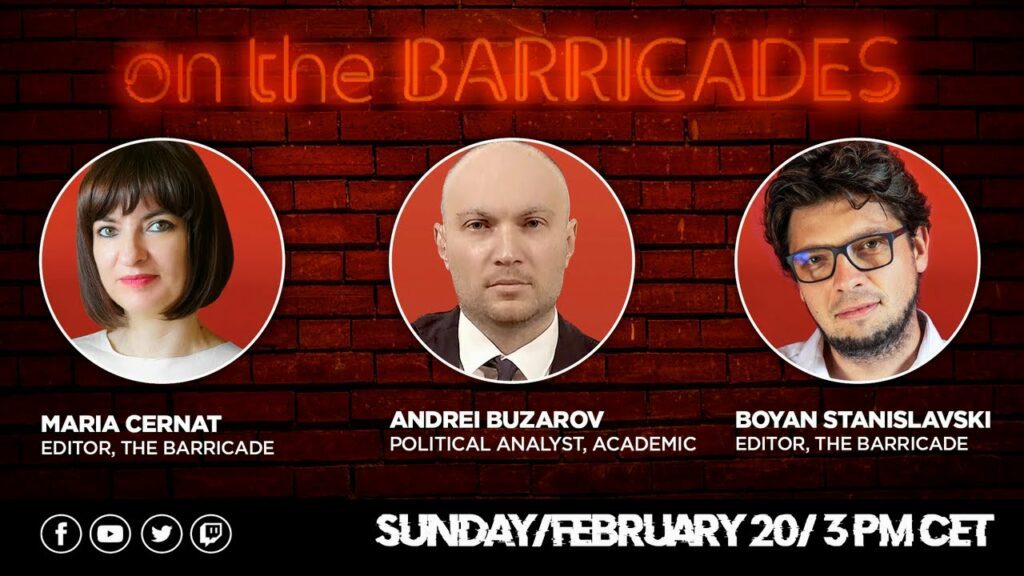
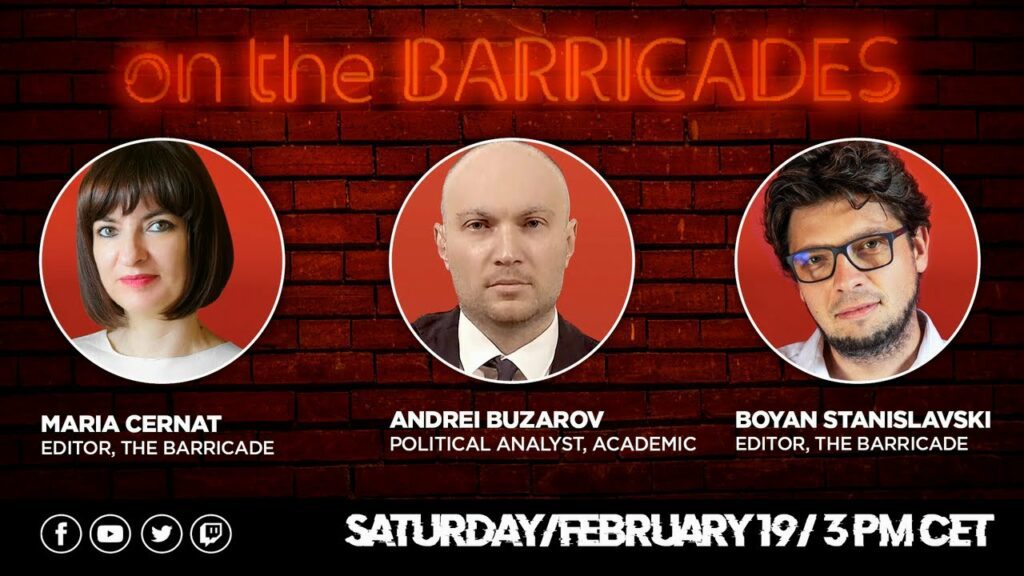
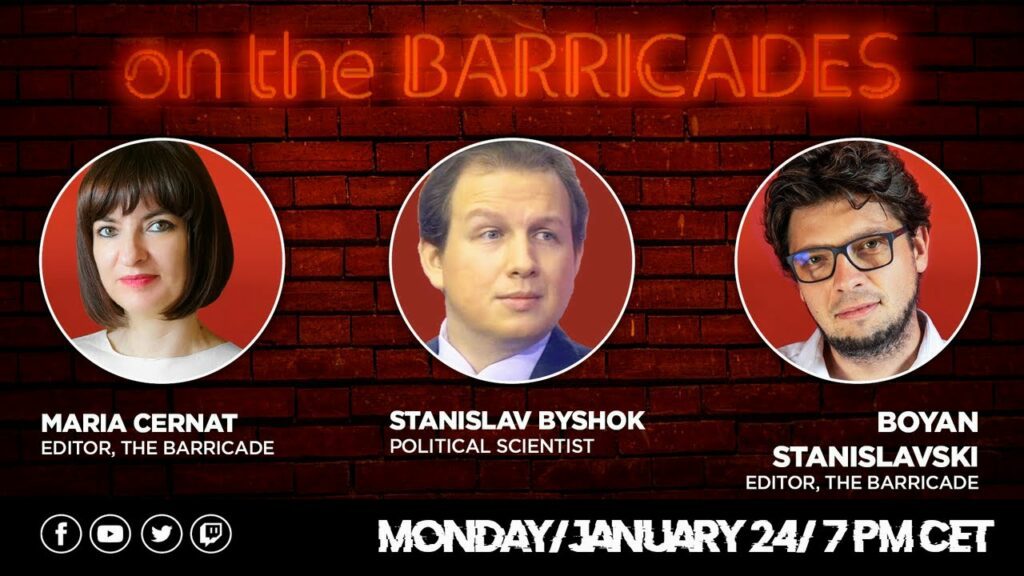
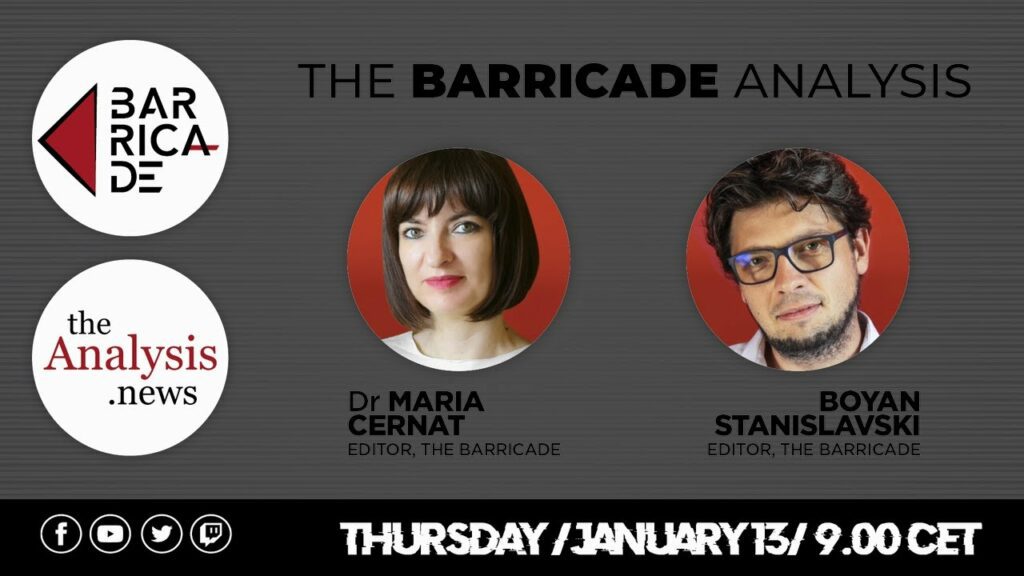
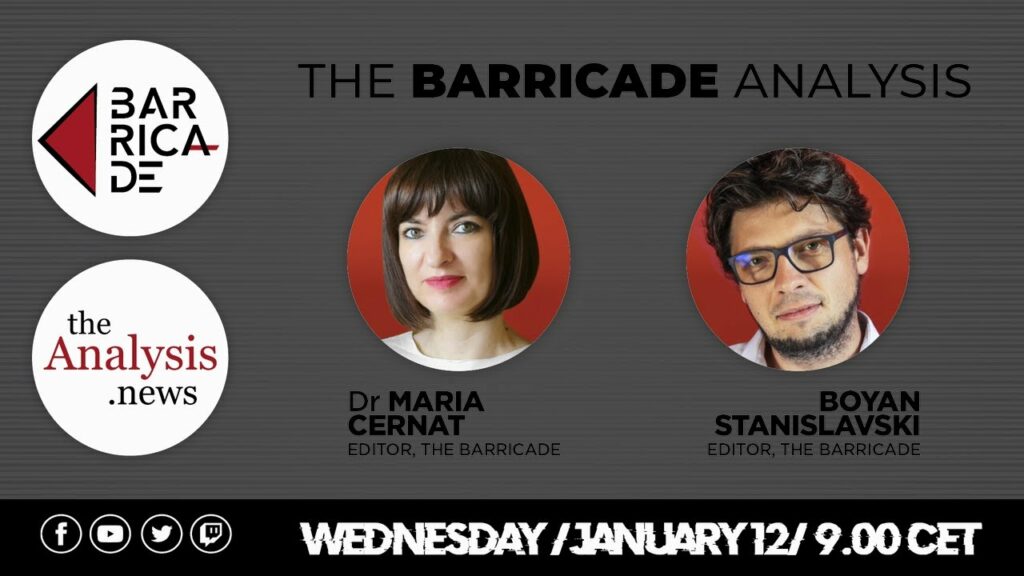
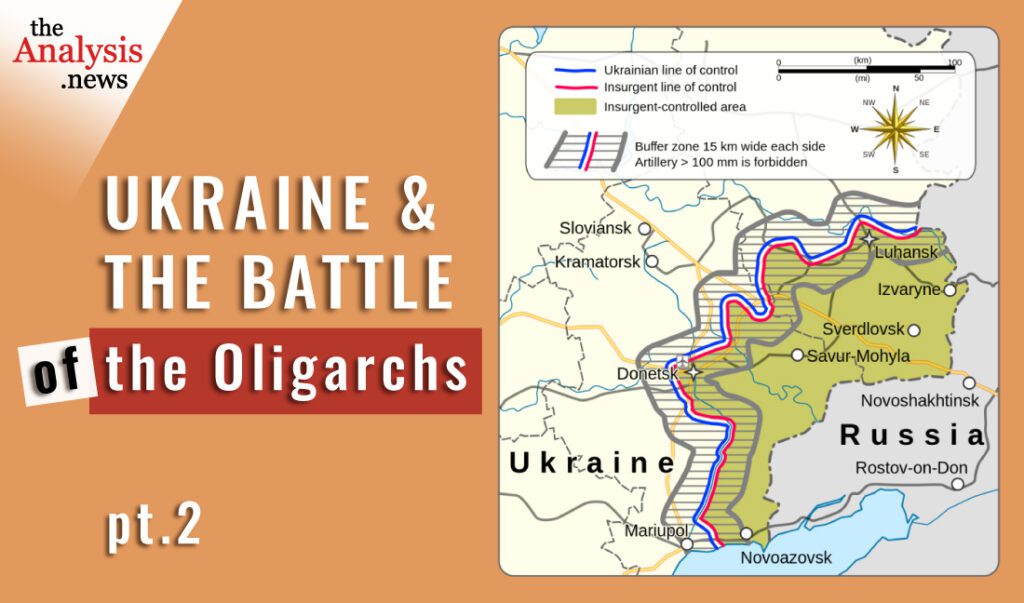
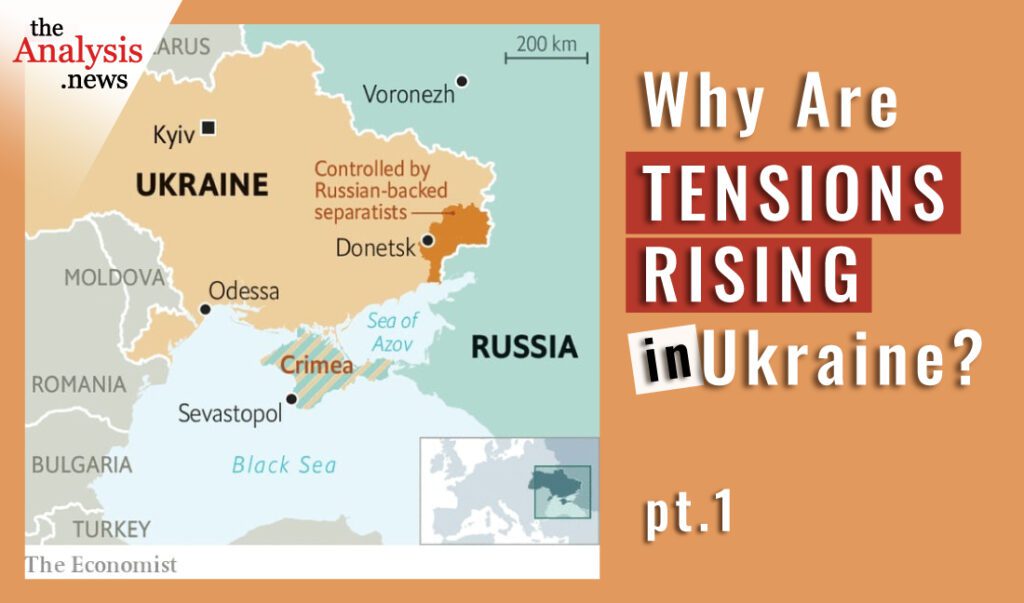
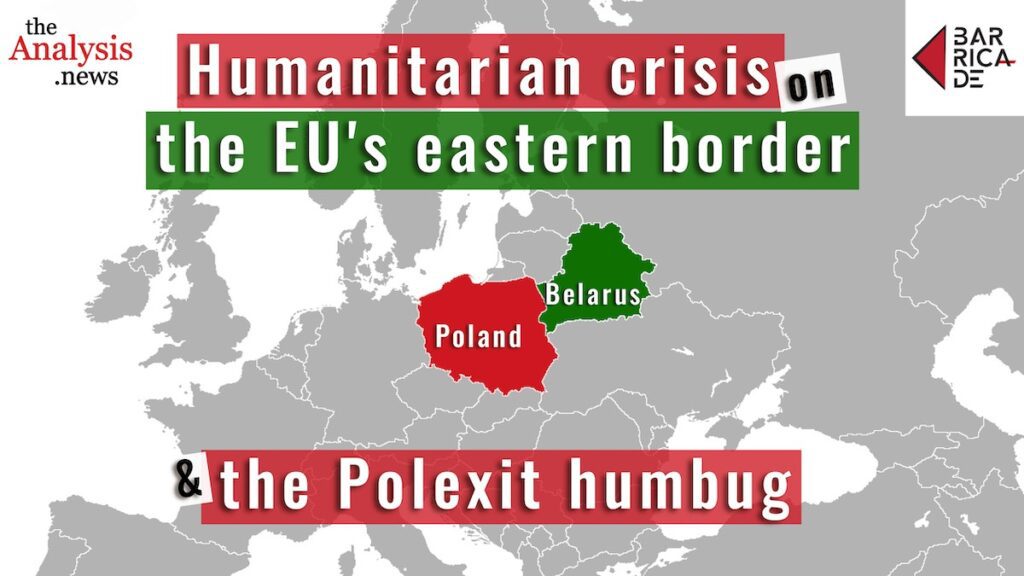
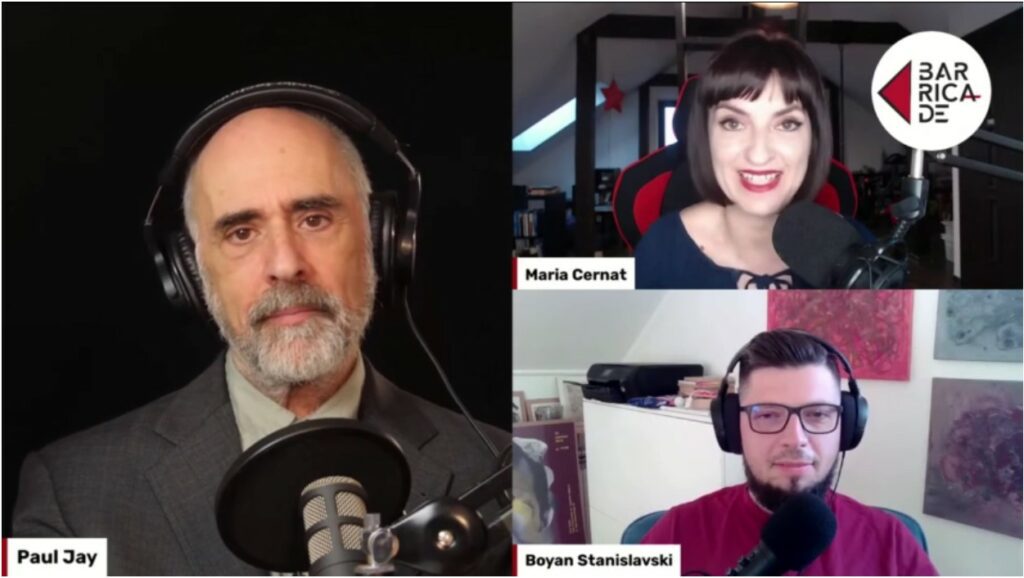
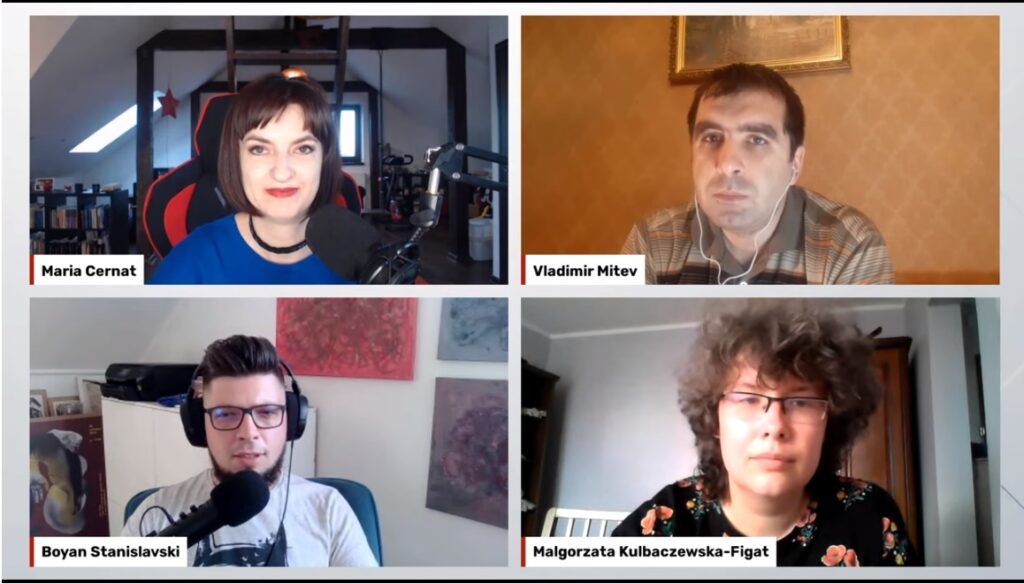
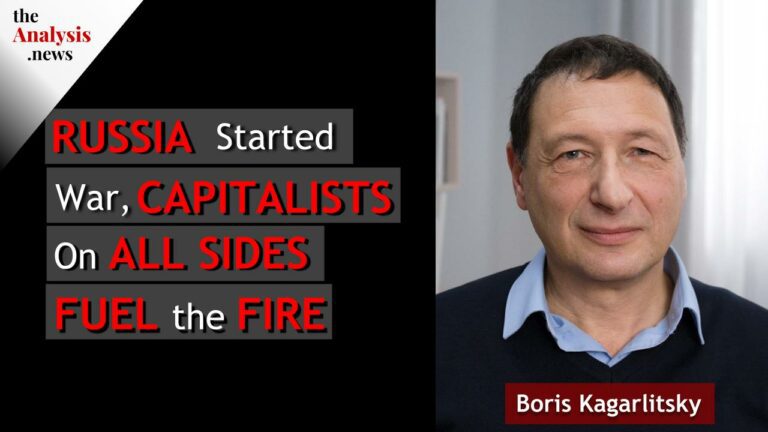
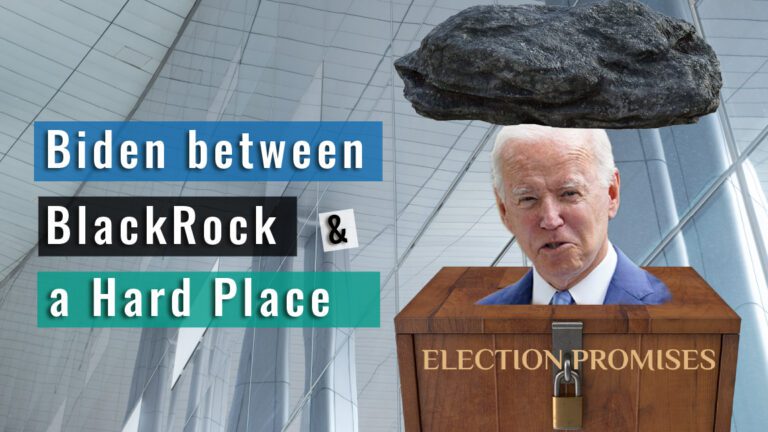
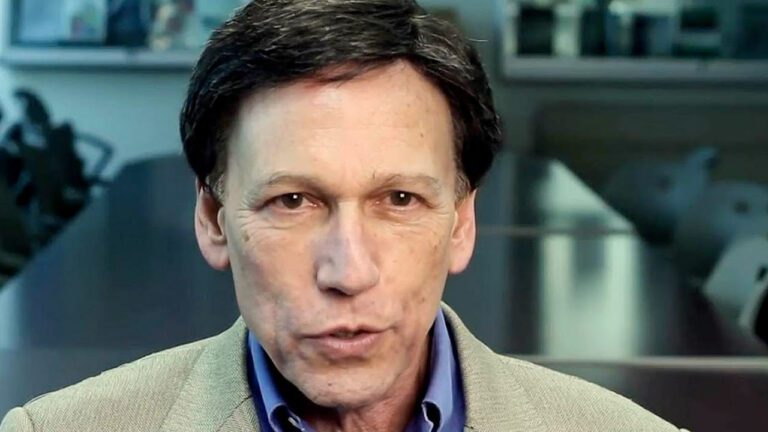


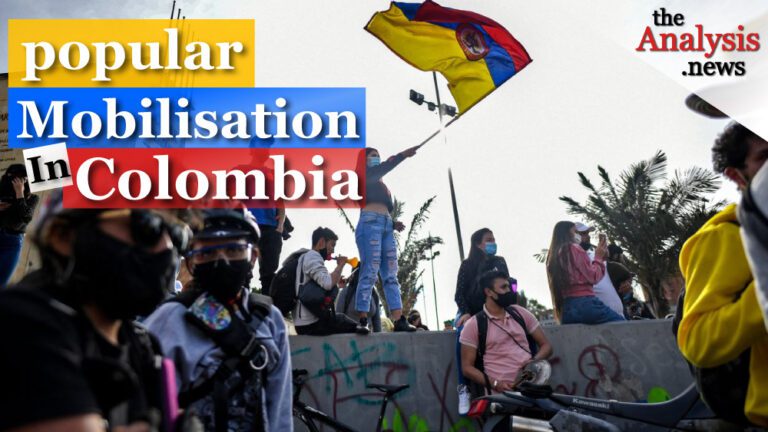
Stanislavski says-
“And I’m wondering what kind of reciprocity? Russia seems to be put in a situation where it cannot make any further concessions.
Maria Cernat
Why not?
Boyan Stanislavski
The next concession would be something like giving up or—
Maria Cernat
Yes, of course, [crosstalk 00:09:44].
Boyan Stanislavski
Of course, they could just maybe surrender to the West or something. But I’m wondering.
Maria Cernat
There is always the possibility, you know.”
This has to be one of the dumbest f&cking conversations I’ve come across about the Russia vs USA in Ukraine conflict. “Of course, Russia could just surrender or something”: and these people ostensibly claim to have some knowledge about eastern Europe and Russia!? LOL! I guess surrendering and abandoning socialism back in ’91 wasn’t enough surrendering? Need to surrender again and give everything of value in Russia to corporate America? Yes: this is what these idiots are suggesting. Hmmmmm, let me guess: is this ‘on the barricades’ funded by the NED? The CIA cutout front? Oh yes, completely surrender to the USA, what a brilliant idea. That’s what Ghaddaffi did, and guess what happened to him: the US military pulverized his country to rubble and let the head choppers invade that country and literally impaled him on a bayonet! And for sure the USA wants to impale Putin on a bayonet. Surrendering to the USA means literally and figuratively being RAPED: raped of any natural resources of value, having the countries’ people fucked over with shit jobs like corporate america has done to USA’s population.
What a shitty show! Stupid people making stupid comments like this asshat Stanislavski. If I was in the audience I’d be throwing rotten tomatoes at that idiot 😀